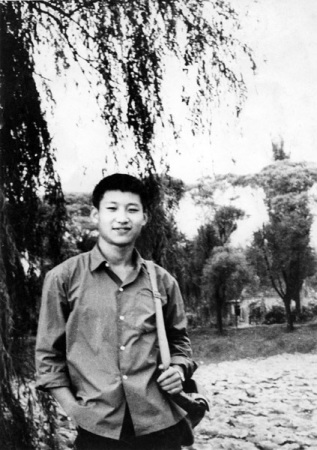
File photo taken in 1972 shows Xi Jinping returns home in Beijing to visit his relatives during the time when he is an educated youth in countryside. (Xinhua)
Xi Jinping, the newly elected general secretary of the Communist Party of China Central Committee, has a unique experience as an "educated youth" in rural China when he was a young man. Xi is believed to be deeply steeled by his early years.
A son of Xi Zhongxun, a Communist revolutionary hero and former vice premier, Xi Jinping did not live in comfort as a boy.
Beginning in 1962, when his father was wronged and fell in disgrace, Xi experienced tough times. During the Cultural Revolution (1966-1976), he suffered public humiliation and hunger, experienced homelessness and was even held in custody once.
At the age of 16, he volunteered to live in a small village in northwest China' s Shaanxi Province as an "educated youth."
That area, part of the Loess Plateau, was where the Communist revolutionaries, including his father, rose to found New China.
Life there was tough for a city youth. In the beginning, fleas troubled him so badly he could not even fall asleep. In the Shaanxi countryside, he had to do all sorts of harsh labor, such as carrying manure, hauling a coal cart, farming and building water tanks.
As time passed, tough work became easy. Xi became a hardworking capable young man in the villagers' eyes. By gaining their trust, he was elected village Party chief.
He led the farmers to reinforce the river bank in a bid to prevent erosion, organized a small cooperative of blacksmiths in the village, and built a methane tank, the first in landlocked Shaanxi.
He was once awarded a motorized tricycle after being named a "model educated youth." However, he exchanged the tricycle for a walking tractor, a flour milling machine and farm tools to benefit the villagers.
Although he was not in school, Xi never stopped reading. He brought a case of books to the village and was always "reading books as thick as bricks," recalled by villagers of Liangjiahe.
He formed close ties with the villagers during his seven years in the province. After he was recommended for enrollment at Tsinghua University in 1975, all the villagers queued to bid him farewell and a dozen young men walked more than 30 kilometers to take him to the county seat for his trip back to Beijing.
Xi has never forgotten the folks in the Shaanxi village. Even after he left, he helped the village get access to power, build a bridge and renovate a primary school. When he was Party chief of Fuzhou City, he returned to the village, going door by door to visit people. He gave senior villagers pocket money, and schoolchildren with new schoolbags, school supplies and alarm clocks. When a farmer friend got sick, Xi, then a senior provincial official of Fujian, at his own expense, brought him to Fujian for better medical treatment.
Xi has said that the two groups of people who have given him the greatest help in his life are the older revolutionary generation and the folks in the Shaanxi village where he lived.
Xi's affection for the common people influenced him as he made a number of critical decisions. In the 1980s when many of his contemporaries were going into business or leaving to study abroad, Xi gave up a comfortable office job in Beijing and went to work as deputy Party chief of a small county in north China's Hebei Province. Later he became Party chief of Ningde Prefecture in southeast China's Fujian Province, one of the poorest regions at the time.
In Ningde, he sometimes traveled for days on the mountain roads to reach the farthest corner of the prefecture. The roads were so bumpy that he often had to take a break to recover from back pain before arriving at his destination. He once walked nearly five hours on a rugged mountain road to get to a township called Xiadang, which was not accessible by highway, and received the most passionate welcome from local residents, who said Xi was "the highest-ranking official who has come to the village."
He also helped thousands of farmers in Ningde renovate dilapidated thatched houses and guided fishermen to live better lives on the land.
When working as Party chief of Fuzhou, capital of Fujian Province, he took the lead in the country in establishing a mechanism for officials to meet with petitioners face to face. He introduced the same mechanism in places where he later served.
Once, he and other senior officials in Fuzhou met with more than 700 petitioners in two days.
While working in east China's Zhejiang Province, he went down into a coal mine nearly 1,000 meters underground and walked more than 1,500 meters along a narrow and inclined shaft to visit miners and see their working conditions before the Spring Festival in 2005.
Xi attaches importance to communication with the people via news media. He wrote a popular column for Zhejiang Daily, using the pen name Zhexin. In his column, he discussed everyday problems of interest to the common people in 232 articles.
As mild a person as Xi is, he is very tough in policing officials and preventing them from harming the interests of the common people.
His work style earned him the nickname "secretary of the people."
"Officials should love the people in the way they love their parents, work for their benefit and lead them to prosperity," Xi said.

Copyright ©1999-2011 Chinanews.com. All rights reserved.
Reproduction in whole or in part without permission is prohibited.